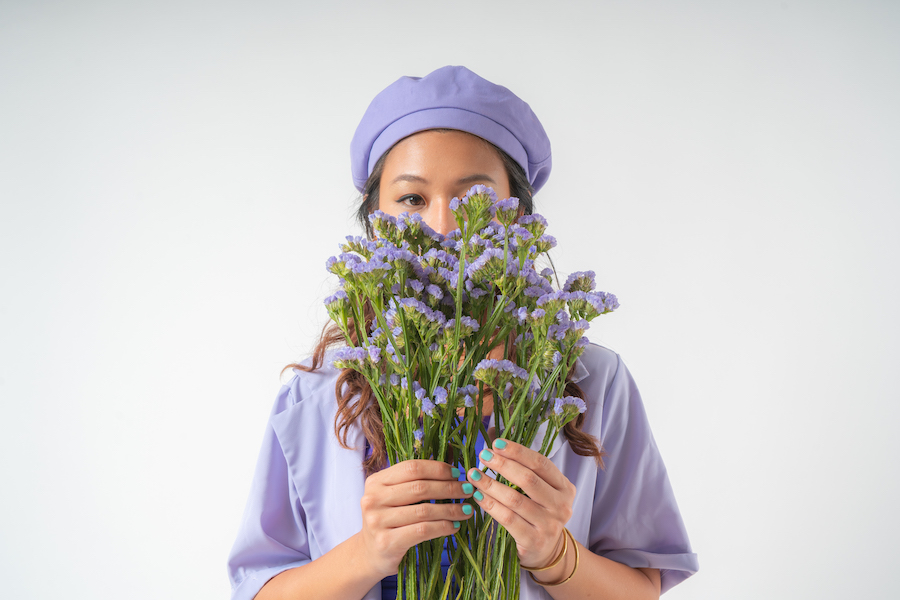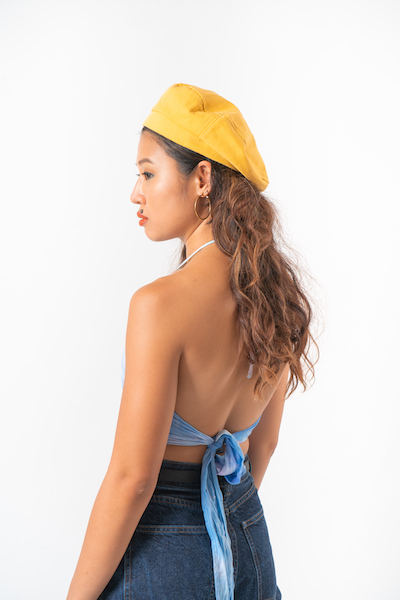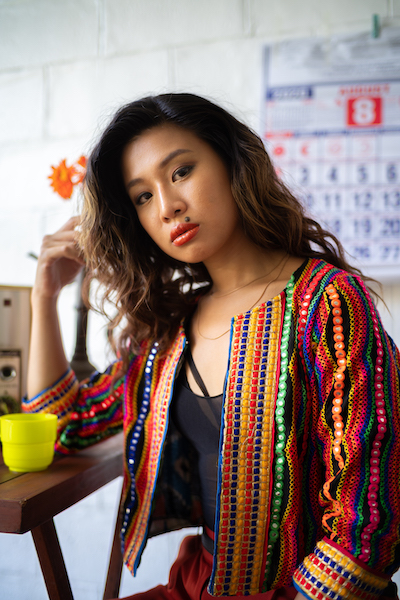Fiery Neo-Soul in Bisaya? August Wahh Has Us Covered with Twin-Song Release
On the cover of the two-song split release for Samok4n and Call3d Ur Bluff is the kick-ass cover art of a Girl Scout on a military armored personnel carrier. The girl’s got on a backwards baseball cap, a cute dog of an ornamental breed beside her, and the M-16 in her hands is firing pastel confetti and flowers in the air as the tank is set to run over a bunny and delicate China dinnerware.
This is an apt image of the sound of R&B and Neo-Soul Singer August Wahh. A celebration of both strength and smooth in synergy, a charm offensive that comes on strong and yet has impeccable timing.
It’s a special thing, apropos of which, because the girl on the tank is the young August herself, taken when she was still in elementary school, in her hometown of General Santos City in South Cotabato.
Now singing in her native tongue has all led to this new split release, an emerging duality grown from chrysalis to full sonic confidence, an identity to rep to the world.
“The cover art is a picture of me in 5th grade,” said August Wahh. “I got home from school to a tank parked outside our house for my dad's shop to fix. I was a Girl Scout and my dad thought it was perfect that I was wearing that. So I got in the tank and our shop guard lent me his rifle.”
Born August Haw, the young performer came of age at a time when alerts against terrorist raids and overall safety were a concern for both military and local police in the province. A time when Task Force GenSan kept up to eight police stations fully staffed at each barangay of the city.
“I grew up during a time where public places in General Santos City were getting bombed often and kidnapping for ransom was rampant. It plagued the city with fear,” August declared. “I grew up having a no-bullshit attitude toward life, having to experience something so real and terrifying. I decided taking that picture and making it the art work for my first Bisaya single was appropriate.”
August’s journey from the Tuna Capital of the Philippines to being the only Filipino performer on the upcoming SEA Revive Arcade Music Festival is a triumph of trust in one’s creative guns. And hard work. Lots of hard work. Before she became a sought-after film scorer and beat-maker, she fronted the local soul band Chocolate Grass and wrote a jingle for the local Tuna Festival TVC.
She eventually moved to Manila in 2007 to pursue a course in Music Production at the College of St. Benilde, becoming part of the artist roster of Deeper Manila and the Buwan Buwan Collective. She has since opened for Daniel Caeser, RAC, and even Erykah Badu, collaborating with artists Similar Objects and Like Animals.

As a solo artist she has evolved by leaps and bounds from her 2019 Labyrinth EP to the 2020 Vivid EP. Now with the 2-track split, August always seems to be relentlessly exploring the limits of her sonic reach while also consolidating her comfort zone of hip-hop and R&B. Thus, Girl Scout August on the tank, now singing in her native tongue has all led to this new split release, an emerging duality grown from chrysalis to full sonic confidence, an identity to rep to the world.
Released last April and produced by Guilty Keys, there’s a duality to the twin songs on the single split release that makes it easy to reach for yin-yang metaphors. Samokan feat Cookie$ talks about irritation couched in Bisaya humor and idioms, coaxing those who cannot chill down from their aggro heights (“Grabe ka, relax sa gud diha / Toxic na, klaro sakong mata”). Humorous hooks in one hand and beer in the other.
I always tell my Tagalog friends how it's pretty impossible to translate Bisaya humor and I guess I wanted to pay homage to my mother tongue and the culture.
August is aware of this setup: the mock outrage of the first song dovetails with the images of Japanese rope bondage in the accompanying music video, and then it sets up the serious, deeper reflection of the sister track Called Ur Bluff. A slower burn in hip-hop territory, this second track showcases both a seething atmosphere and August’s rap skill. Her West Coast rhythm and flow still manages to make the angry diatribe an enjoyable one, even as she declares: “Always sunny where I’m at/ But man, I feel the shade.”
While Samokan calls out foibles as it frolics in R&B daylight and the heat of humorous sarcasm, Called Ur Bluff deliberates calmly and coolly on deeper grievances in the still hours of night. It’s a coming to fruition that her previous releases, especially the delicate and ecstatically restrained Woo Woo, (an easy hit and one of my faves) hinted at but never quite realized.
We caught up with August as her playlist was full of Little Simz, Brent Faiyaz, Audrey Nuna, and ROMderful, to talk about her journey, the two-song split, and performing for the prestigious Revive Arcade Music Festival in December.
***
Growing up in General Santos City, performing with Chocolate Grass, and then studying in CSB. What was the kind of music you grew up to and loved and, as your tastes have changed, what are the new influences you realize have exerted their hand into your sound?
AUGUST WAHH: I grew up listening to my dad's songs which was a lot of 70's disco and pop standards. As I grew older, my sisters and I really got into RnB and Gospel music, and that broadened when I went to get a music degree in CSB.
Chocolate Grass was into so much soul music and I really tried to embody that. Having to study music kind of helped me understand what I liked and what I didn't like. I like songs that stick to you like white on rice, or songs that just give mood for days. As long as they give me feels and it gets my head bopping, I'm all for it.

Samokan and Called Ur Bluff are like yin and yang tracks. Take us through the process of writing and then recording them.
AW: They are! It started with my manager showing me Cookie$ Bogo music video and how it was such a hilarious yet powerful diss track and I just found the whole attitude so relatable, being Bisaya and all. We reached out to Cookie$ shortly after that and I guess as we got to talking, we bonded over our roots and Bisaya humor and I wanted to channel our "bisaya-ness" into a song.
We both recorded it remotely and just kept in touch. I've always wanted to write in Bisaya because it's my first language but I never did because it's something that I've never truly tried doing before. Speaking it and writing it are completely different so I wanted to challenge myself by expressing a sentiment through the lens of my heritage.
Singing in Bisaya in Samokan, first time you’ve done this on a track. How conscious was this choice and, of course being from Gen San, was it important to you to channel Bisaya idioms and registers in your music this time?
AW: I feel it's more my annoyance and intolerance towards toxic authority figures and people that project their unawareness of self toward others. Writing Samokan in Bisaya was definitely a conscious choice and the idioms definitely gave more color to what I was trying to say.
I always tell my Tagalog friends how it's pretty impossible to translate Bisaya humor and I guess I wanted to pay homage to my mother tongue and the culture. To properly channel the intention behind the song, which is the embodiment of being unapologetically cheeky and blunt, I definitely had to write in Bisaya to lessen the blow of the seriousness of the next song, Called Ur Bluff.
It's still hard, but in my own way I can be 'brash and swaggering' too.
The declarative line about karma “Wa ka kahibao ang gaba di magsaba” (Bet you didn’t know that when karma comes, it's quiet) feels like a very apt one, especially for the choice of Japanese Shibari rope art and therapeutic S&M images for the music video. Looks like you guys had fun shooting there!
AW: We did! We worked with Dom and Clem from Zoopraxis on this one. They had the idea of Shibari just to make it more cheeky and I thought the concept tied in perfectly with the need to express the humor and to appropriately convey the message of the song. I wanted a subtle "f*ck -you" to the people that don't know how to keep their chill, so to tie them up with their consent and to hang in stillness was such a perfect idea. Karma is like that. It hits you harder when you don't submit to it. It grows you, so you either fight it and make it harder for yourself or you learn from it and move on.
Called Ur Bluf is like the understated twin sister of Samokan but with even more depth the more you listen to it. What was it inspired by?
AW: I wrote both songs for the people that could relate to my sentiments. Called Ur Bluff is the no- bullsh*t sister of Samokan. She sees through it, and will call it like it is as opposed to Samokan being like "Yo, you need to chill. Have a beer, ya? "
What were the challenges and fears that came with trying to make it as a female artist in a genre usually dominated by brash, swaggering young men?
AW: It's still hard, but in my own way I can be "brash and swaggering" too, I guess. I also truly believe that you are your worst critic so being assertive and knowing what I like helps me through it. I'm not easily intimidated and I focus on my own stuff. I write to impress myself.

This whole journey to finding your unique and robust sound through all your EPs, do you sometimes just look back at how far you’ve come and marvel at your accomplishments?
AW: When I write songs I just kind of do it without really thinking about why at the moment. It just feels right turning whatever strong emotions or thoughts into something tangible. So I like to go back and psychoanalyze why I wrote something and why I wrote it that way. It gives me a better understanding of how I want to move forward with my art as I grow. My songs are like journal entries: prose to remind me of where I've been and what I've conquered through my journey. Words are powerful. They speak your thoughts into existence.
At the upcoming Revive Arcade Festival in December, you are repping the Philippines as our only performer, is it still an exciting prospect to be part of such a large event even with the limitations of being in a virtual, non-physical space?
AW: It always is! It's exciting how festivals are adapting to put on a great experience for the viewers and it's definitely amazing to be a part of it.
In light of all that, what else do you essentially still dream of or desire to achieve?
AW: The overarching mission is to express and to inspire. I wish to be able to do this for as long as I can and grow with it you know. And yeah, so much more I want to do and want to happen, it's limitless.


